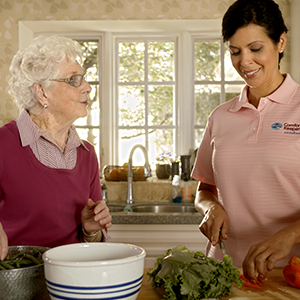More Coronavirus Resources:
Monday, February 9, 2015
For adults who want to age in their own homes, following good eating practices can play a critical role in ensuring their later years are enjoyable and independent. Unfortunately, for many people, years of poor choices begin to catch up with them as they enter their senior years, and the result is an increased risk of chronic diseases, disability, reduced mobility, and cognitive impairment. The good news is that it is never too late for older individuals to modify their nutritional habits and decrease or reverse their risk for many preventable diseases and impairments. All they need is a little motivation.
Although the overall nutritional needs of older adults are the same as those for younger adults, their caloric needs are reduced and their ability to absorb nutrients can be affected by physical changes. This means they need a nutrient-dense diet to obtain sufficient nutrition without risking weight gain. Many older adults eat more calories than are necessary, which has a significant health impact. In 2010 more than one third of older adults were obese (compared to only 19% in 2002 and 12% in 1990), and that percentage is expected to rise as the senior population increases. At the other end of the spectrum, some older adults, especially the very old, have an inadequate nutritional intake, which can lead to frailty, osteoporosis, falls, and hip fractures.

Many older adults understand the recommendations for healthy eating, but struggle with motivation to change. One study showed that those who are just beginning to think of making changes can be more greatly motivated when shown the specific benefits they would receive from changing their eating habits. For those who were more ready to change, a how-to approach demonstrating techniques for reaching their goals had a greater impact. In general, the best results come from tailoring the approach to individuals’ specific motivation, risks, and behaviors.
Studies also show that connecting with and supporting older individuals as they make modifications to their diets can make a difference. Physician counseling has an impact, but family and friends can motivate senior adults even more, especially since family and friends can better take into account seniors’ ethnic and cultural backgrounds. This is especially important when you consider that food and eating habits can be closely connected with a person’s identity.
For older adults who are not eating enough, simply ensuring that they have company during meals can make a significant difference. When people eat alone, they are less likely to cook for themselves, and they tend to eat less. Having regular reminders of what to eat and when can help improve seniors’ nutritional intake. When family and friends are not available, older adults can benefit from an in-home caregiver who can help them with meal planning and preparation, support them in their efforts, and provide company during meal times. Professional caregivers can also help keep track of what the senior is eating and let the family know if there is a concern.
Overall, changing eating habits can positively impact senior adults by lowering their risk of chronic disease, improving cognitive functioning, reducing disability rates, and lowering medical costs. To learn more about how in-home care can help seniors meet their nutritional needs, contact your local Comfort Keepers® office today.
References
Center for the Advancement of Health. (March 2006). A new vision of aging: Helping older adults make healthier choices. Issue Briefing No. 2.
http://www.ncoa.org/improve-health/center-for-healthy-aging/content-library/NewVisionAging_HealthierChoices.pdf.
Culross, B. (2008). Gerontology update: Nutrition: Meeting the needs of the elderly. ARN Network. Retrieved from http://www.rehabnurse.org/pdf/GeriatricsNutrition.pdf.
Fakhouri TH, Ogden CL, Carroll MD, et al. (2012). Prevalence of obesity among older adults in the United States, 2007-2010. NCHS data brief, no 106, National Center for Health Statistics. http://www.cdc.gov/nchs/data/databriefs/db106.htm.
Locher, J.L. and Sharkey, J.R. (April 9, 2009). An ecological perspective on older adult eating behavior. In C.W. Bales and C. S. Ritchie (Eds.). Handbook of clinical nutrition. (pp. 3-17). New York, NY: Humana Press.







